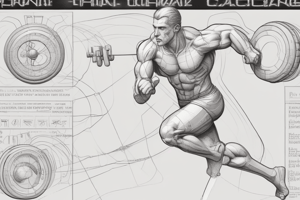Podcast
Questions and Answers
What are some key attributes of a good coach?
What are some key attributes of a good coach?
Some key attributes of a good coach include designing a program with individual needs in mind, monitoring recovery and fatigue, applying the latest research and best practices, and being able to toss aside their own egos.
What advantages does working with a coach provide, even for those well-versed in human physiology and training principles?
What advantages does working with a coach provide, even for those well-versed in human physiology and training principles?
Working with a coach allows individuals to apply knowledge and utilize a full skillset without being hampered by athlete bias or ego, and it helps in peeling back layers of bias and ego that could blind them from making productive choices.
Why is coaching oneself a challenging task?
Why is coaching oneself a challenging task?
Coaching oneself involves peeling back multiple layers of bias and ego that could blind them from making the most productive choices, not to mention the challenges of self-accountability.
What is the nature of the 'subtle science and exact art' mentioned in the text?
What is the nature of the 'subtle science and exact art' mentioned in the text?
What are some potential downsides of coaches who are beholden to poor practices?
What are some potential downsides of coaches who are beholden to poor practices?
Flashcards are hidden until you start studying
Study Notes
Key Attributes of a Good Coach
- A good coach has the ability to observe and provide feedback on an individual's performance, helping them to identify areas for improvement.
- They possess excellent communication skills, allowing them to effectively convey their message and build strong relationships with their clients.
- A good coach is knowledgeable in human physiology and training principles, but also aware of their limitations and when to seek additional guidance.
Advantages of Working with a Coach
- Even experienced individuals can benefit from a coach's objective perspective, helping to identify blind spots and areas for improvement.
- A coach provides accountability, helping to ensure consistency and motivation in training.
- They can help individuals develop a personalized approach, tailored to their unique needs and goals.
Challenges of Coaching Oneself
- It can be difficult to objectively assess one's own performance, leading to biased or inaccurate feedback.
- Self-coaching may lack accountability, making it easier to fall into poor habits or procrastination.
- It can be challenging to develop a well-rounded training plan without the input of an experienced coach.
The Nature of Coaching as a 'Subtle Science and Exact Art'
- Coaching involves a deep understanding of human physiology and training principles, requiring a nuanced approach to individualized training.
- It demands a combination of scientific knowledge and artistic application, balancing theory with practical experience.
- Effective coaching requires a delicate balance between pushing an individual to their limits and avoiding injury or burnout.
Downsides of Poor Coaching Practices
- Coaches who are beholden to outdated or unproven methods may hinder an individual's progress, rather than helping them to improve.
- They may prioritize their own reputation or financial gain over the well-being of their clients, leading to negative outcomes.
- Poor coaching practices can lead to a lack of trust and confidence, ultimately undermining the coach-client relationship.
Studying That Suits You
Use AI to generate personalized quizzes and flashcards to suit your learning preferences.




